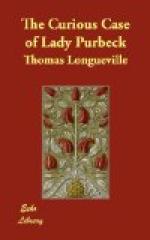This intervention on the part of the French Government made Lord Scudamore fear lest l’affaire Purbeck might lead to international complications, and he presently adds: “Coming to the knowledge of this particular this Morning I thought good to hasten the Messenger out of the way.”
Fortunately for Lady Purbeck, she was not without a friend in Paris. About a year before she went there, a curious character had arrived in the person of Sir Kenelm Digby, a son of the Sir Everard Digby who had been executed for having been concerned in the Gunpowder Plot. Sir Kenelm was well known, both at home and abroad. He had stayed at Madrid with his relative, the Earl of Bristol, at the time when Prince Charles had gone to Spain to woo the Infanta. He had been a brilliant ornament at the Court of Charles I.; but, like all the relations of Bristol, he had been hated by Buckingham. Armed with letters of marque, he had raised a fleet and ravaged the Mediterranean in the character of a privateer. He was literary, philosophical, metaphysical and scientific. When he came to Paris his beautiful wife had been dead a couple of years, and the smart courtier had thrown off his hitherto splendid attire, had clothed himself in black of the very plainest, and had allowed his hair and beard to grow as they would, ragged and untrimmed. Shortly before the arrival of Lady Purbeck in Paris, Sir Kenelm had declared himself a Catholic; and the fact that both he and Lady Purbeck had submitted themselves to the Catholic Church may have formed a bond of union between them. Sir Kenelm soon contrived to interest Cardinal Richelieu in Lady Purbeck’s case, and not only Richelieu but also the King and the Queen of France.
A certain “E.R.” wrote[96] to Sir R. Puckering: “The last week we had certain news that the Lady Purbeck was declared a papist.” And then he went on to say that Louis XIIIth and the Queen of France, as well as Cardinal Richelieu, had sent messages or letters to Charles I., begging him to pardon Lady Purbeck and to allow her to return to England. He also said that the French Ambassador at St. James’s was “very zealous in the business.” Shortly afterwards he added: “It is said she is altogether advised by Sir Kenelm Digby, who indeed hath written over letters to some of his noble friends of the privy council, wherein he hath set down what a convert this lady is become, so superlatively virtuous and sanctimonious, as the like hath never been seen in men or women; and therefore he does most humbly desire their lordships to farther this lady’s peace, and that she may return into England, for otherwise she does resolve to put herself into some monastery. I hear his Majesty does utterly dislike that the lady is so directed by Sir Kenelm Digby, and that she fares nothing better for it.”
Of course anybody would naturally sneer at the suggestion that the convert to a religion other than his own could possibly be remarkable for either virtue or sanctity: but there is no visible reason for sympathising with the sneers of (E.R.), or for doubting Sir Kenelm Digby’s evidence respecting Lady Purbeck.




